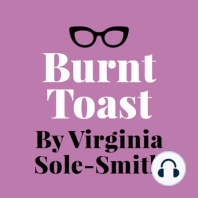41 min listen

Fatness Is Not The Trauma, with Rachel Millner
Fatness Is Not The Trauma, with Rachel Millner
ratings:
Length:
30 minutes
Released:
Sep 30, 2021
Format:
Podcast episode
Description
Hello and welcome to another audio version of Burnt Toast!This is a newsletter where we explore questions (and some answers) around fatphobia, diet culture, parenting, and health. I am Virginia Sole-Smith. I’m a journalist who covers weight stigma and diet culture, and I’m the author of The Eating Instinct and the forthcoming Fat Kid Phobia.Today, I’m pleased to be chatting with Dr. Rachel Millner, a psychologist based in Newtown, Pennsylvania who specializes in eating disorders. Welcome, Rachel! I’m so excited to talk to you. Before we dive into our big topic, why don’t you tell our listeners a little more about yourself and your work?RachelAs you already said, I’m a psychologist, outside of Philadelphia, I’m in private practice here. I work primarily with folks who are dealing with eating disorders, disordered eating, those wanting to heal their relationship with food and body. I do a lot of work around anti fat bias and weight stigma. And I frequently talk about “atypical anorexia” and weight stigma and how those issues play out within the eating disorder field.VirginiaAnd you have an awesome Instagram that I will link to in the transcript. I also interviewed you for a New York Times piece last year. (And this Good Housekeeping story!) What I wanted to chat with you about today, what kind of inspired this conversation, is an Instagram post you did back in June, and I’ll just read the text here. You wrote: And I sort of had a real like, yes moment reading this. I think this probably resonated with a lot of folks, and for other folks, this might be sort of confusing. There are a lot of misconceptions about the relationship between trauma and weight. There’s just a lot we can unpack here.So first, I would love to hear a little bit of the background of what inspired this post for you.RachelI think, you know, there is so much nuance here. And it’s one of those topics that I think does bring up a lot for people, because of all the weight stigma. You know that when we start a conversation around trauma and fatness, given the weight stigma in the culture, of course, we all kind of go into high alert and brace ourselves for like, okay, what’s coming next? What prompted this Instagram post was just sitting with clients and hearing their stories and feeling like their stories aren’t being told. And wanting to name that for some people, there might be a connection between fatness and trauma. The other side of that narrative that’s so harmful, is this idea that if we heal trauma, then somehow we’re magically not going to be fat anymore. This is something that’s projected onto my clients all the time. So I was just thinking about these conversations that I have in my office all the time, that are never told.VirginiaI’ve heard this from readers before, where they almost feel like they’re being a “bad fatty” if they say, “I think my body size is related to this experience I had.” That really denies their truth. And it makes it difficult for them to tell their story.I mean, it gets really messy, it gets really messy. So, I guess, you know, for folks who are newer to this conversation, it might be useful to start by talking about some of those relationships you’re seeing among your clients? How does trauma sometimes relate to body size? What scenarios are you kind of referencing here?RachelThe story that I hear from my clients is that when they were going through trauma, particularly childhood trauma, although I think it’s also true for people who have experienced trauma as an adult, that oftentimes food is what’s available to cope. If somebody is in a home where they’re being traumatized, or a child who doesn’t have access to therapy or other ways of getting support, food is often available. And it’s a really effective coping mechanism. It can be really helpful to eat in response to sadness or pain or suffering. And for some people, that eating may lead to weight gain, not for everybody, but there’s, you know, people who, that eating in res
Released:
Sep 30, 2021
Format:
Podcast episode
Titles in the series (100)
The Value and Visibility of Momfluencer Bodies by Burnt Toast by Virginia Sole-Smith